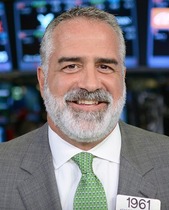
Proprietary Trading
Proprietary Trading refers to a financial firm or commercial bank that invests for direct market gain, rather than earning commission dollars by trading on behalf of clients. This approach provides the firms with the full economic interest in the profits, which incentivizes higher risk management and innovation in trading strategies. One of the main reasons firms engage in prop trading is in the pursuit of substantial profits. To engage in prop trading, traders use different financial instruments, including stocks, bonds, commodities, currencies or other instruments. Proprietary traders may execute an assortment of market strategies that include index arbitrage, statistical arbitrage, merger arbitrage, fundamental analysis, volatility arbitrage, technical analysis, and/or global macro trading.
Experts
Ari Paul
Art Hogan
Brian Shannon
Chris Tyrer
Christophe Ollari
Cormac Kinney
Dean Curnutt
Edward Misrahi
Eric Chemi
Eric Peters
Euan Sinclair
Florian Bartunek
Francis Hunt
George Saravelos
Guy Keller
Hudson Cashdan
Jim Leitner
Jon Najarian
Kenny Estes
Kenny Polcari
Kevin Davey
Kokou Agbo-Bloua
Larry McMillan
Maleeha Bengali
Marc Chaikin
Marko Kolanovic
Michael Prendiville
Nancy Davis
Pete Muller
Peter Tchir
Scott Slayton
Steen Jakobsen
Steve Sosnick
Steven Goldstein
Sudhu Arumugam
Thomas Peterffy
Todd Edgar
Tom Busby
Xavier Rolet
Yoni Assia
BENEFITS OF A PROP FIRM
Access to Capital.
Prop firms provide traders with access to capital, which can be used to trade a variety of financial instruments.
Training and Education.
Many prop firms offer their traders training and education programs. These programs can teach you the ins and outs of trading and how to use different strategies effectively.
Support and Membership.
Prop firms typically have a team of experienced traders on social media platforms who can provide support and mentorship.
Prop firms typically have risk management teams in place to help traders manage their risk. This can be beneficial for both new and experienced traders.
Prop firms usually have access to sophisticated trading tech that can give traders an edge in the market. This can include trading platforms, data feeds and analytical tools.
STRATEGIES AND TRADING STYLES
Diverse Trading Approaches
Futures: Some prop firms actively engage in futures trading which allows them to speculate on the price movement of assets over a given timeframe.
Options: Some incorporate options trading due to its flexibility in hedging and the ability to strategize around various market scenarios.
Forex Trading: Forex trading exploits the fluidity of currency markets to capitalize on short-term exchange rate fluctuations.
Adapting Strategies to Market Conditions
Analyzing Trends. Prop firms adapt their strategies to the rhythm of the market, often utilizing trend analysis to gauge market direction.
Using Technology. Strategies also involve leveraging advanced technology and algorithms, particularly for market making, to execute trades within microseconds in response to changing market conditions.







































